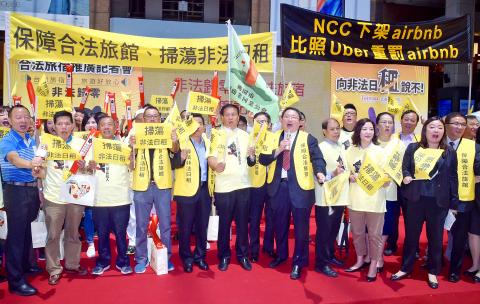The Tourism Bureau yesterday reiterated that the nation has laws to regulate hotels and other types of short-term accommodations, and that all Internet platforms are required by law to remove ads posted by illegal operators.
At a news conference at Taipei Railway Station, the bureau vowed to step up efforts to crack down on illegal lodging.
The agency is to increase communication with Airbnb and other platforms that advertise accommodations, bureau Director-General Chou Yung-hui (周永暉) said.

Photo: Huang Yao-cheng, Taipei Times
The bureau is to confer with the National Communications Commission about working together to crack down on illegal operators, he said, adding that it would also seek legislative support to raise penalties for illegal operators.
“Some only lack registration; they should quickly register their businesses and become legal operators,” Chou said.
Japanese Internet firm Rakuten has promised to voluntarily review all listings on its platform and remove those by illegal operators, the bureau said.
Booking.com, Agoda, TripAdvisor and Expedia have also indicated that they would take down listings on their platforms by illegal operators when notified, it said.
San Francisco-based online hospitality service operator Airbnb said in an interview with the Liberty Times (sister newspaper of the Taipei Times) that it voluntarily took down all illegal home-sharing listings in Japan after the Japanese government passed an amendment to the Hotel and Inns Act that provided a clear definition of a “home-sharing service.”
Airbnb said that it would be happy to comply if the Taiwanese government enacts regulations similar to those of Japan.
However, the government should not ignore that an increasing number of people seek to enrich their travel experiences by staying with locals voluntarily sharing their homes, it said.
The bureau said it would list on its Web site the online platforms that are unwilling or hesitant to comply with the nation’s laws, adding that all illegal home-sharing listings would be referred to local government officials.
“Internet platform operators should adhere to Taiwan’s regulations on hotels and short-stay rentals,” the bureau said.
The offerings of Taiwan’s legal hotels and bed and breakfasts have become diverse, with each having its own characteristics and reputation, the bureau said.
“Tourists might be seeking low-cost accommodations, but problems generated by illegal operators or short-stay rentals — from safety concerns, tax issues and possible invasion of guests’ privacy to consumer disputes — have caused them to be banned around the world,” the bureau said.
“All legal hotels have passed official evaluations for fire and public safety, hygiene and other elements, and are also required to insure all their tenants,” the bureau added.

The first global hotel Keys Selection by the Michelin Guide includes four hotels in Taiwan, Michelin announced yesterday. All four received the “Michelin One Key,” indicating guests are to experience a “very special stay” at any of the locations as the establishments are “a true gem with personality. Service always goes the extra mile, and the hotel provides much more than others in its price range.” Of the four hotels, three are located in Taipei and one in Taichung. In Taipei, the One Key accolades were awarded to the Capella Taipei, Kimpton Da An Taipei and Mandarin Oriental Taipei. Capella Taipei was described by

EVA Airways today confirmed the death of a flight attendant on Saturday upon their return to Taiwan and said an internal investigation has been launched, as criticism mounted over a social media post accusing the airline of failing to offer sufficient employee protections. According to the post, the flight attendant complained of feeling sick on board a flight, but was unable to take sick leave or access medical care. The crew member allegedly did not receive assistance from the chief purser, who failed to heed their requests for medical attention or call an ambulance once the flight landed, the post said. As sick

Minister of Economic Affairs Kung Ming-hsin (龔明鑫) yesterday said that private-sector refiners are willing to stop buying Russian naphtha should the EU ask them to, after a group of non-governmental organizations, including the Centre for Research on Energy and Clean Air (CREA), criticized the nation’s continued business with the country. While Taiwan joined the US and its Western allies in putting broad sanctions on Russia after it invaded Ukraine in 2022, it did not explicitly ban imports of naphtha, a major hard-currency earner for Russia. While state-owned firms stopped importing Russian oil in 2023, there is no restriction on private companies to

INDUSTRY: Beijing’s latest export measures go beyond targeting the US and would likely affect any country that uses Chinese rare earths or related tech, an academic said Taiwanese industries could face significant disruption from China’s newly tightened export controls on rare earth elements, as much of Taiwan’s supply indirectly depends on Chinese materials processed in Japan, a local expert said yesterday. Kristy Hsu (徐遵慈), director of the Taiwan ASEAN Studies Center at the Chung-Hua Institution for Economic Research, said that China’s latest export measures go far beyond targeting the US and would likely affect any country that uses Chinese rare earths or related technologies. With Japan and Southeast Asian countries among those expected to be hit, Taiwan could feel the impact through its reliance on Japanese-made semi-finished products and